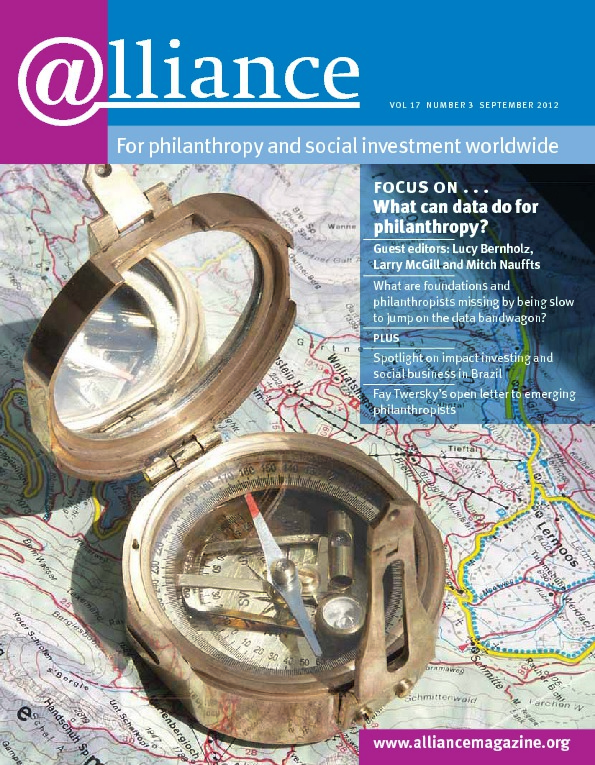In March 2012 Resource Alliance and the Rockefeller Foundation commissioned a research project to investigate how philanthropists involved in international development assess and manage risk and how they might do this better. The starting point was evidence that many individual philanthropists and foundations are unnecessarily risk averse.  The research was based on interviews with 27 key players including major philanthropists, philanthropic intermediaries and staff from leading foundations.
The research was based on interviews with 27 key players including major philanthropists, philanthropic intermediaries and staff from leading foundations.
Interviewees identified two key types of risk: impact risk (the risk of not achieving the desired impact due to inaccurate strategic assumptions) and operational risk (not having the right approach to implementation of strategy). Financial, reputational, political and personal risks were points of concern but most often within the context of impact or operational risks.
On risk assessment the authors found that:
- Both individual philanthropists and foundation officials take decisions about risk in part by drawing upon other life experiences, often drawn from other contexts with very different dynamics. This allows irrelevant data or biases to inform decisions. Over time both groups develop more risk tolerance as they become more familiar with the context and impact measures of philanthropy.
- Those new to philanthropy are inclined towards projects with more certain outcomes. On a 10-point scale, with 10 being ‘the most certain outcome’, almost all respondents new to philanthropy leaned towards 9 or 10. A small subset were also inclined to pursue some projects with highly uncertain outcomes but high potential impact. One interviewee explained that all of his projects had been unsuccessfully attempted by other organizations. What attracted him was learning from the multiple failures, adapting, and re-attempting the projects.
- Individuals and organizations are more sensitive to perceived losses than to perceived gains. As one philanthropist said, ‘I worked hard to earn my money, so I do not want it to be wasted’. Another foundation officer indicated that ‘in the absence of an institutional policy on seeking high risk/high opportunity projects, many colleagues find it safer in terms of management oversight to gravitate toward predictable outcomes’.
On risk management the authors found that:
- Philanthropists and foundation staff with extensive experience become more comfortable with risk as they grow to understand the stakeholders with whom they work. One interviewee working with sick children said that his confidence in his ability to manage risk had grown as he came to understand the full system of children, families, healthcare providers and health systems. Given that it takes time to develop such an understanding, several interviewees recommended staged entry into projects, with small incremental early gains that facilitate the learning necessary to empower greater impact and reduce risk in later stages.
- The interviewees most comfortable with risk were those with diversified risk portfolios, which permit greater acceptance of risk in any single project. One philanthropist favoured seizing ‘low-hanging fruit’, which then creates patience among stakeholders for tackling more complicated issues.
- Philanthropists and foundation staff all stressed the importance of learning from others in the field to reduce both risk and perceptions of risk. One interviewee in Asia created his own informal network of six philanthropists to serve as a mutual sounding board, with great success.
The Rockefeller Foundation and Resource Alliance have already acted on a number of these recommendations. In June 2012, the two organizations hosted a small group of new philanthropists from Africa and Asia to discuss how to engage in development-oriented philanthropy. Developing sophisticated tools for balancing risk and opportunity was the focal point of several of their discussions. The group strongly recommended that a forum be created for the sharing of best practices to help new philanthropists move quickly past their early ‘risk averse’ stage.
The Rockefeller Foundation, the Council on Foundations and Alliance magazine partnered to hold discussions in New York and Washington DC on recommendations for balancing risk and opportunity. Further discussions to create concrete recommendations for new philanthropists in Africa and Brazil may emerge soon. The interest in philanthropy and risk, so strongly stated at the Bellagio Summit in 2011, is building momentum towards practical recommendations for new and established foundations.
Adrian Sargeant is the Robert F Hartsook Professor of Fundraising at Indiana University. Email asargean@iupui.edu.
Rob Garris is managing director, Bellagio Programs, at the Rockefeller Foundation. Email RGarris@rockfound.org.
For more articles on the topic of risk, see the June 2012 special feature on Opportunity, risk and global development.


Comments (0)